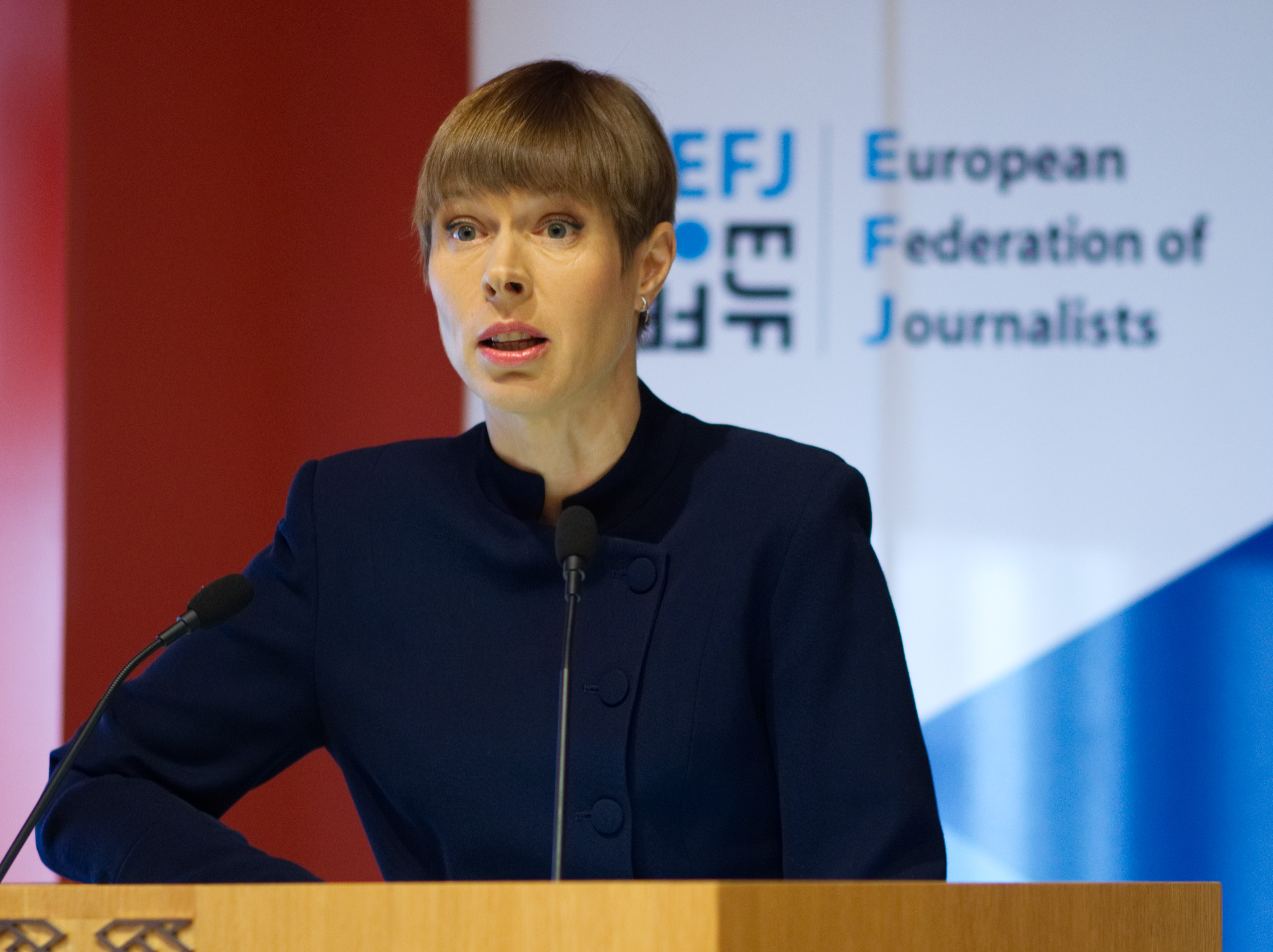Baltic exchange: Europe’s journalists’ confer in Tallinn

A report on the general meeting of the European Federation of Journalists in Tallinn, Estonia 9 – 10 May 2019
Listening to Estonia’s president (pictured above), it would be easy to feel optimistic about press freedom and media plurality. Kersti Kaljulaid’s address to around 100 attendees at the European Federation of Journalist’s (EFJ) general meeting was, from a head of state, a refreshingly unambiguous commitment to the need for unfettered reporting and openness.
She basked in her country’s impressive 11th place in the Reporters Sans Frontiers ‘press freedom’ rankings, and made it clear that retaining such a position required determination and bravery on the part of legislators. “Without the open windows of a free media, a society quickly becomes musty”, she said.
Just hours after the president’s speech, however, the Estonian journalists’ union, EAL, painted a significantly darker picture of the state of their national media. It raised current threats to limit media freedom that are more quickly evident in smaller countries. It drew attention to the open talk of closing the Estonian State Broadcaster or taking its content under political control and the calls for critical newspaper journalists to be punished. Those Estonian politicians who refuse to engage with critics in the press were highlighted, as were faltering economic models and struggling freelances. EAL’s motion concluded that without significant additional action, Estonia faces an ‘Orwellian future’.
The distance between those visions represents, in microcosm, the EFJ’s challenge – and, indeed, that of all of use who advocate for free journalism. We must find ways to represent the deeply challenging conditions in which we produce honest journalism in an environment where being beguiled by comfortable platitudes is easy.
Retaining a sharp focus on this task has tested every one of Europe’s journalist unions. Dramatic headcount losses in newsrooms brought on by tumbling circulations and free-falling advertising revenues have dominated the landscapes for the past decade. Unsurprisingly, it has been no less an issue for our European federation.

On the basis of the outcome of the meeting in Tallinn, most European affiliates are satisfied with the current leadership’s approach to this. It certainly represented a personal triumph for Mogens Blicher Bjerregard, the Dane who defeated Italy’s Anna Del Freo, to be elected EFJ president for a third and final term. Critical voices were eliminated from the EFJ’s steering committee, however, with a ruthlessness that looked defensive and may well be interpreted as hostility by some affiliates.
To the untutored eye, discerning the fault lines between the factions that vie for influence in the EFJ is not easy. For most of its recent history, the federation’s leadership has been dominated by an alliance of Scandinavians and Germans. The core of the opposing block is drawn from the UK, France, Italy and Spain.
One of the few points where ideological differences were exposed came in discussion of a motion of the EU’s recently adopted Copyright Directive. The original motion, submitted by SNJ-CGT (France), EAL (Estonia), NUNS (Serbia), FSC-CCOO (Spain) included the line: “A call to open the text to amendments was lost by just 5 votes”.
This referred to an attempt made, very late in the passage of the Copyright Directive, to completely reopen negotiations on its contents. Those who supported this position argued that the directive might yet be improved. Opponents of reopening the text said that limitations on legislative time would mean that that ‘reopening’ would have the effect of shelving the Directive for a decade or more.
Even though these events are now historical, reference to this initiative hit a nerve. The implication of this line was that the EFJ would have preferred the text to have been reopened. The motion’s proposer and his opponents were dispatched to confer in private. Half an hour later, agreement to delete the offending sentence had been reached.
Such a slight point of contention might be interpreted as an organisation at ease with itself. That the meeting stuck on that wrinkle, however, even for just a moment, showed up the separating contours. On one side a more corporatist, consensus-seeking Scandinavian approach, on the other one shaped by a sense that workers’ and employers’ interests rarely coincide.
Along the way, good motions were adopted that called on the EFJ to intensify work to protect journalists from violence at work, support Belarusian freelances, oppose the jailing of journalists in Turkey, support the independence of news agencies and develop a fresh strategy to deal with the media’s gender divide. Attention was also drawn to such individual cases as the murder of Lyra McKee, and the imprisonment of Swedes Gui Minhai in China and Dawit Isaak in Eritrea.
Such a. meeting provides only limited opportunities to better understand a host country’s culture, alas. The importance of Estonia’s recent story to its national consciousness, however, was shown up in a tiny tableau that I witnessed as I picked up my conference credentials.
The desk was staffed by long-standing activists from the Estonian Journalists Association. As one of them stuck the conference passes to attendees’ lapels, she asked with a smile “when was your association founded?” In most cases, their answer allowed her to observe that the EAL, having been founded in 1919, pre-dated them. Her evident pride in her union’s longevity was heartwarming. Indeed, reflecting on her repeated question, I wished that I had affected ignorance that the NUJ is 12 years the EAL’s senior.
I can’t imagine a British NUJ activist troubling to make a similar point. But, perhaps, were we not so complacent about our national narrative, the UK’s current trajectory would not be quite so convulsed in confusion?
I attended the conference at the invitation of the EFJ’s steering committee to be a member of the three-person presidium that ran the conference. I was joined in this role by Gregor Kucera from GPA-djp (Austria) and Dominique Pradalié from SNJ (France).
Images © Tim Dawson